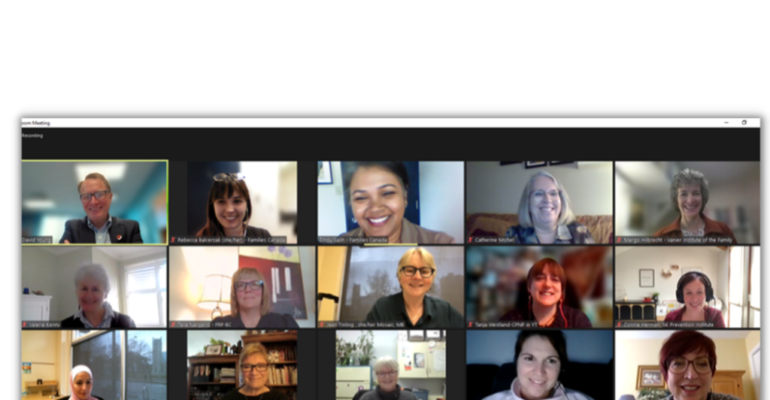 09 Dec 2022
09 Dec 2022
Families Canada Hosts First National Roundtable Discussion
“There was a lot of energy in the room as people from across the country shared similar stories and concerns. So, very good to bring people together almost as a support network.” - Participant Testimonial
Families Canada is pleased to have hosted our first National Roundtable on Family Support, hosted by David Young, on Wednesday, November 9, 2022. The virtual event was attended by 21 participants across Canada and allowed all participants to connect with like-minded people and organizations across the country and learn more about what is happening in other provinces with family support and timely issues.
The lively discussions were focused on the presentation of Family Diversities and Family Demographics Across Canada - by the Vanier Institute of the Family. Another timely and important topic of the roundtable discussed the emerging impacts of COVID-19 on children, families, and the family support sector. Before the opportunity for questions and more discussion, the group explored the learning and experiences in Truth and Reconciliation. The national roundtable benefitted all attendees with the opportunity to inspire future conversations within the family support sector.
“I love that we all feel the same about what's going on in our center, it was kind of a relief.” -Participant Testimonial
Presentation on Family Diversities and Family Demographics Across Canada – by Margo Hilbrecht, at The Vanier Institute of the Family
The presentation on Family Diversities and Family Demographics Across Canada gave participants an overview of family diversities and family demographics in Canada. Research and data collection were utilized to examine laws and policies to share evidence about family diversities and inform decision-making that supports family well-being.
What did we learn?
It was noted that food insecurity increased in many provinces due to the pandemic and recent inflation. We learned that some organizations are trying to fill that gap by focusing on food justice instead of food security by utilizing a more dignified rather than a charity model approach. Participants identified the significant number of participation of women in research, as well as put forward suggestions to extend research using more gender diversity initiatives.
Emerging Impacts of COVID-19 on Children, Families, and the Family Support Sector
Participants highlighted the following impacts of COVID-19 on children, families, and the family support sector:
- High rents, renovictions, lack of housing – all conspiring to create a surging homeless population.
- Food security is rising, and many grassroots stop-gap measures are being implemented.
- Family violence, parenting challenges, poverty, isolation, food insecurity, and homelessness have also increased.
What did we learn?
Most participants noted that the COVID-19 pandemic had created unprecedented conditions resulting in social isolation for families across Canada. It was identified that many organizations continue to experience challenges trying to support families due to inflation and lack of transportation for families in certain areas.
Learning and Experiences in Truth and Reconciliation
Upon a review of the learning and experiences in Truth and Reconciliation, the discussion presented options to be implemented at various organizations. Some of these include providing training to their members and board, purchasing Indigenous-authored books from Indigenous-owned or local bookstores for staff, and determining the ‘why’ behind their land acknowledgment. It is important to understand history as this can impact our connection to the land.
What did we learn?
A video was shared on 5 Things You need to Know about Reconciliation by Len Pierre The video highlighted key points that are foundational to understanding what it means to participate in reconciliation moving forward.
- You can’t skip the uncomfortable part. If we don't, our decisions will be superficial and drastically misinformed. We must uncover the truth first.
- Reconciliation is for everyone. Reconciliation is for every single Canadian citizen who lives, works and plays in our colonial state.
- Reconciliation really is about justice doing. Reconciliation is not about being kind or respectful, or inclusive. It is not something we know but something that we evoke and create action around us.
- Don’t be afraid of the hashtag or phrase #landback. Land back is about restoring the authority of our lands to the Indigenous peoples who have been caretakers and stewards of those lands since the beginning of time.
- Reconciliation is not going to be perfect. We’re driven by our sense of perfection, but reconciliation is not going to be perfect. Reconciliation is about a relationship. And there's no such thing as a perfect relationship.
In being asked if Families Canada should host another national roundtable event, 100% of participants voted “Yes!”.
Families Canada looks forward to hosting another roundtable and is consulting participants on timing. The national roundtable benefitted all attendees with the opportunity to inspire future conversations within the family support sector.




Families Canada